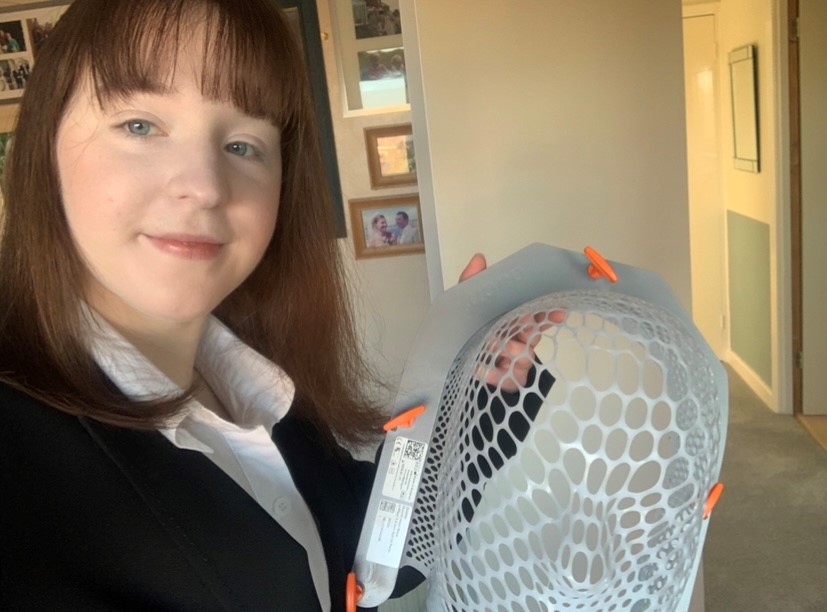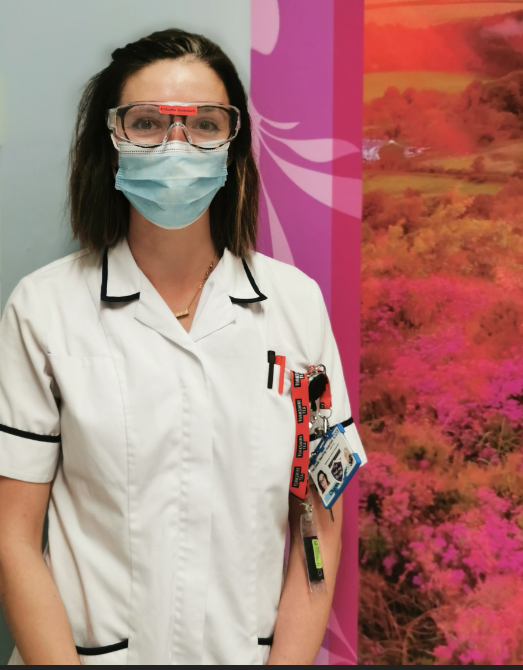

Inspirational Story
Emily Reed
Where did you study?
I previously studied Health Sciences at my local university, and this was a foundation year. After that, I moved to Sheffield, and I am currently studying BSc Radiotherapy and Oncology at Sheffield Hallam University.
What was it about Therapeutic Radiography that made you want to pursue this career?
My mother was first diagnosed with breast cancer in 2002, I was a year old, so cancer has always been a part of my life. It recurred in 2010, and at this point, I was at an age where I had some idea of what was going on. Then, more recently, my grandma had been diagnosed with cancer, I was seventeen and at this time, I was considering what I wanted to study at university.
Did you have any work experience before applying for University?
I had already had some work experience in a Radiotherapy Department; while my grandma was having radiotherapy, she mentioned to the staff that her granddaughter was interested in doing this as a career. So, they told her, why don’t you bring her along, and we can show her what we do.
This really inspired me, because I got to see how the Therapeutic Radiographers were with my grandma, and myself, and I got to be a part of her treatment pathway.
I saw her at her most vulnerable, but I also got to offer her reassurance. This moment that the Therapeutic Radiographers gave me, was what solidified my choice to study Radiotherapy and Oncology, and gave me a profound amount of respect for the profession and staff.
My grandma passed away in 2020, so it is bittersweet that I can’t share with her what I have been doing.
What did your journey looked prior to starting your course?
Initially, I wanted to do something in Creative Writing or English Literature, but my mother pointed me towards Radiography because of her positive experiences with staff.
When I attended an open evening at my local hospital while I was still at college, I got to meet the Clinical Lead, Melanie Clarkson, who asked me if I would keep in touch about my progress. I don’t think I would have tried so hard to if it weren’t for that encouragement, as it was not something I had expected; this was also before my grandma had radiotherapy. Her interest in how I was progressing was what pushed me to keep up with this profession, and I am so grateful to her that I did.
While I was doing my foundation year, in one of our modules, I got to tailor the content of my assignments towards Therapeutic Radiography.
I also met Jo McNamara at the open evening, who is the Course Leader at Sheffield Hallam, and I remember after speaking to her, it was my first taste of the course and what it offered.
I’ve been at my happiest since beginning the course because I have found a profession which inspires me to work, to support and help other students to the best of my ability, and to want to make an impact
Does your personal experience of disability influence your role?
It did when I was deciding if this was something realistic that I could do and be able to keep up with. However, the support from family, my parents, and encouragement I have had since I was diagnosed with Dyscalculia in Primary School, it had made such an impact. I never thought that I would get into university; let alone, on a Health course because I struggled so much with maths.
I would normally shy away from academic related activities, but the encouragement and support I’ve had from Jo McNamara while I have been at university has improved my confidence tenfold. I’ve been at my happiest since beginning the course because I have found a profession which inspires me to work, to support and help other students to the best of my ability, and to want to make an impact.
Being part of a neurodivergent group of healthcare students (SSHINE), has encouraged a space where we can share our experiences and work together to create content to help future students, and for the staff that are supporting those students.
Do you think you could see yourself working in another area or profession?
I don’t think I could see myself doing anything else, in or outside of the NHS.
There are so many people I have gotten to know and meet: the staff at university, my course mates, the incredible staff at my placement site; those I’ve gotten to connect with in the Society of Radiographers student forum; the wider Radiography community on Twitter.
Therapeutic Radiography is a rewarding career in which we spend a long time with our patients and become a big part of their lives and treatment pathway, providing optimal personalised care
Any advice for someone who may be considering a career as a Therapeutic Radiographer who has a form of neurodivergence?
Trust yourself. I convinced myself in Primary School that I wouldn’t be good enough to get into university. My mother always told me to have a positive mental attitude, which I tried to maintain, but it took a lot because I had settled with the fact that university might not be an option for me.
I couldn’t enjoy myself as much as I wanted to because I was always worried about what options I would, or would not get to have, if I failed maths. But I put the work in, set myself goals, and it paid off. Constantly thinking of worst-case scenarios is what I did, and gave me a lot of self-doubt, and that is a mindset I wish I could have avoided because I wasn’t sleeping properly.
When I got into Sheffield for Radiotherapy and Oncology, it was like a weight had been taken off my shoulders because I had achieved a milestone that I never thought I would, and to study a profession that holds my passion and the want to make the most of it.
Although it may feel like a weakness, it isn’t, and if you talk about it, you will find support to help you both academically and while you are in placement.
What do you do day to day?
If I am on placement, I like to keep a pad and pen with me to write down anything if I’m answering the phones just so I don’t forget if there is something I have to pass on. Also, if a member of staff asks me to pass on anything to a patient if I am bringing them into a changing cubicle, I will often repeat it to myself a few times so I don’t forget. Where mental maths might be involved, I like to have a calculator with me, as it will take me a little bit longer to process.
My self-confidence has always been very low, so challenging yourself to do something that will take you to do things that are public-facing, or that requires you to talk in front of groups of people you know or don’t know, has helped me significantly.
Therapeutic Radiography is the only HCPC registered healthcare profession permitted to deliver radiation treatments, It is a rewarding career in which we spend a long time with our patients and become a big part of their lives and treatment pathway, providing optimal personalised care – I’m looking forward to what my future career holds for me.

